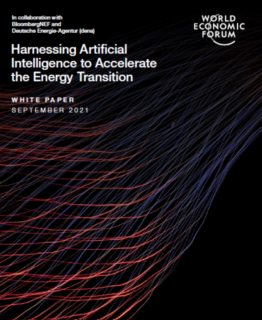-
Artificial intelligence is key enabler of the energy transition
Date posted:
-
-
-
Post Author
Greg Kelsall
-
-
![]()
Artificial intelligence (AI) has tremendous potential to accelerate and support the global energy transition, according to a new study by the World Economic Forum, which highlights the opportunities for enabling a more equitable energy transition. It can act as an “intelligent layer” across many applications to identify patterns, improve system performance and predict outcomes of complex situations. However, leading energy and technology experts say that there are several key barriers preventing AI from being adopted rapidly or at global scale .
Written in collaboration with Bloomberg NEF (BNEF) and the Deutsche Energie-Agentur (dena), the study reviews the state of play of AI adoption in the energy sector, identifies high-priority applications of AI in the energy transition, and offers a road map and practical recommendations for the energy and AI industries to maximise AI’s benefits.
The report finds that AI has the potential to create substantial value for the global energy transition. Based on BNEF’s net-zero scenario modelling, every 1% of additional efficiency in demand creates $1.3 trillion in value between 2020 and 2050 due to reduced investment needs. AI could achieve this by enabling greater energy efficiency and flexing demand.
“AI is already making its mark on many parts of society and the economy. In energy, we are only seeing the beginning of what AI can do to speed-up the transition to the low-emissions, ultra-efficient and interconnected energy systems we need tomorrow. This report shows the potential and what it will take to unlock it – guided by principles that span how to govern, design and enable responsible use of AI in energy. Governments and companies can collectively create a real tipping point in using AI for a faster energy transition” said Roberto Bocca, Head of Energy, World Economic Forum.
High-priority applications for how AI can accelerate the transition to low-carbon energy future include identifying patterns and insights in data to increase efficiency and savings; co-ordinating power systems with growing shares of renewable energy; and managing complex, decentralised energy systems at scale.
Recent efforts to deploy AI in the energy sector have proven promising but innovation and adoption remain limited. AI holds far greater potential to accelerate the global energy transition but it will only be realised if there is greater AI innovation, adoption and collaboration across the industry. To address this, the white paper establishes a set of principles to help industry govern and scale AI technology in a rapid, safe and fair manner.
![]()


